Day 5: Schoolyard Frenzy
Several times on the trek I dreamed of being clean. The trek's end meant a group celebration in Lalibela, freshly showered in clean clothes. But when I woke on Christmas Day, the last day, I knew I wanted more time.
I've never been a true camper. Tents and river baths feel like a hassle. But I didn't have a problem with the lack of electricity and had become accustomed to the dirt on my body. The dry weather helped as well. I loved all the locations and views and especially the communities. If camping always involved kind people preparing simple meals with genuine smiles, teaching me the local dance and providing an eco-toilet with a view...I could definitely get used to this.
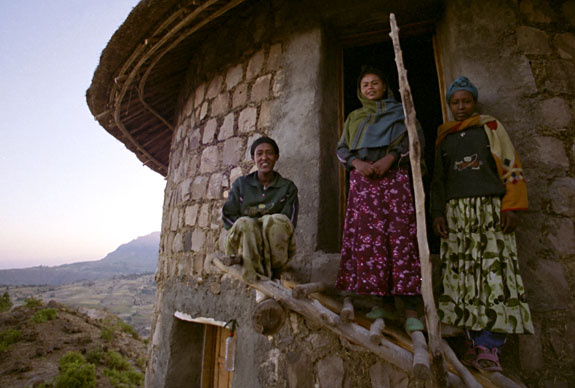
Cooks at Yadukulay, hazardous with wide-runged ladder to the dining tukul and shower & toilet on a rocky slope.
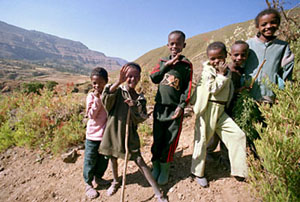 Kids eagerly waving goodbye as we leave Yadukulay |
Smoothest of all five days, this lower-altitude walk was on a wide dirt road. We saw fewer children on this route, perhaps because we were no longer cutting through crop fields. Most of the morning was spent discussing our onward plans: Jodie and Jochen were headed to Addis the next day, Jess would visit Axum the following day and Nina was still worried about getting to her Simiens trek.
Suddenly we realized that the tiny ant children timidly inching our way across the field were coming from a distant school. We stood at the roadside barrier, radiating desire to meet the students until Mulay decided we had time to drop in. The instant we hopped the fence, the madness began.
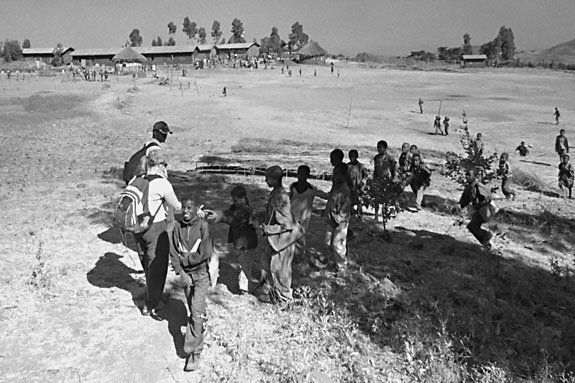
Kids running from the distant school. The others approached the school while Jodie shook hands.
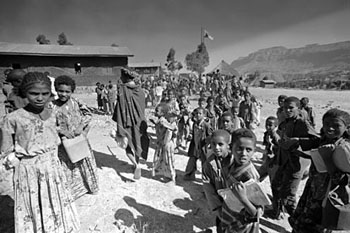 Entering the schoolyard behind our local guide (in the blanket). |
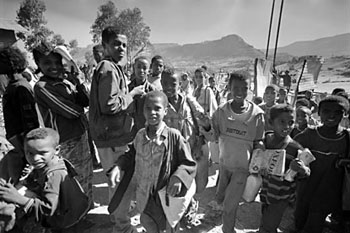 Eager and nervous, some come toward us while others pull away. |
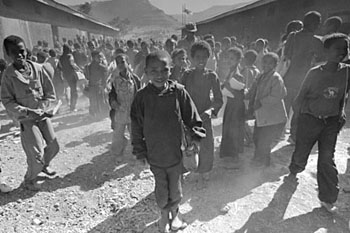 Dust flies as the kids scramble around us. |
Forming a haphazard line, they held their hands out for us to shake each one in turn. It felt like the end of a middle-school soccer match, when you stood in front of the opposing team and went down the line mumbling good game good game good game. Except a hundred times better, as the children effusively welcomed us to their school.
Delirious energy filled the schoolyard as kids fell over each other trying to get close, trying to step back for a better view, trying to get in pictures, trying to touch us and ask questions. The familiar hello hello hello chant grew thunderous as now we faced not 3 or 4 young shepherds in the fields but hundreds of eager, curious students beside themselves with excitement.
We were treated like celebrities. The teachers struggled to maintain calm, ordering students into classrooms. Fear of discipline did little to dissuade the kids, and many still hung in doorways watching us take a tour.
The principal showed us the pitifully small library of donated books; they took whatever books they could get rather than worry about a consistent curriculum. Learning is learning. Perusing the wall poster listing after-school clubs, I noted an HIV/AIDS awareness group (these students were quite young and well-suited for early preparation) and a club against what the principal termed "bad practices"—such as female genital mutilation.
Things calmed down a bit, although with overcrowded classrooms and open doorways, the students couldn't help following us with their eyes as we walked around. I couldn't help noticing they shared their limited textbooks.
Painted on the walls were inspirational quotes in English, maps, and diagrams detailing flower anatomy. Some kids also made their own clever study aids. As we wandered the school grounds a few children shyly followed, showing how the foreigners' arrival curbed the teachers' influence.
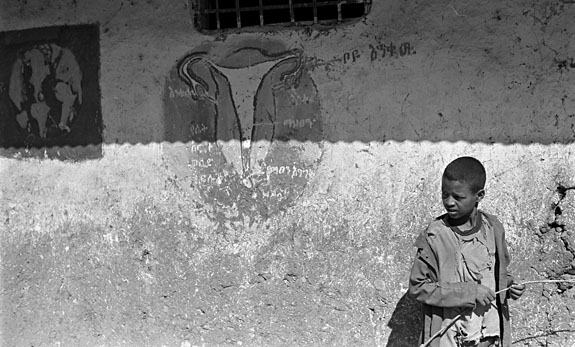
The walls provide additional space for study aids
Caught up in the moment, we steamrolled Mulay's numerous attempts to get going, but eventually he guilted us by saying Habte had been idling in his car since morning. Upon reaching the small town of Taja, where posh people lived in metal shacks rather than tukuls, we happily greeted Habte with exuberant tales of the school visit and the preceding four days.
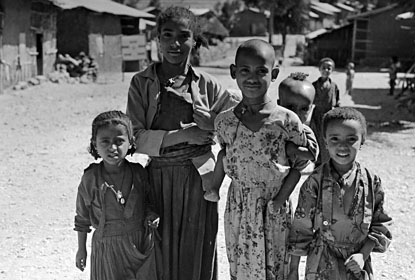 These kids in Taja were sweet until they asked for money |